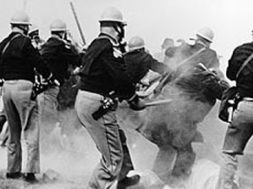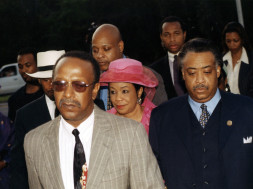
Race and Absent Black Fathers—Twin Roots of Crime and Punishment

In 2003, the United States Justice Department issued a report based upon the 2000 Census that noted that 10.4 percent of the black male population was incarcerated. This number is epidemic when considering that the percentage of Latino men during this same period stood at 2.4 percent while the percentage of white males was 1.2 percent.
Even more troubling was the report’s notation that for the first time in our nation’s history, there were more black males in prison (approximately 700k) than college (600k).
These facts often lead to a couple of questions that I routinely field when discussing my job as a criminal defense lawyer.
The first is whether black males are pre-disposed to criminal behavior. The obvious answer is “no”—as any suggestion of the same reminds me of the old Eugenics arguments from the early 20th Century where “researchers” tried to explain the supposedly inherent racial inferiorities of non-whites based upon “science.”
With such notions now relegated to the trash heap of history, I can state that while pre-disposition is not certain, there are indicators that strongly suggest that certain individuals, regardless of race, are prone to criminal activities based upon their social and/or economic conditions.
During my career, I have been a member of the state’s indigent services panel that allows me, on occasion, to receive appointments in rural North Florida counties where minorities are few in number. In these areas, many of the crimes that seemingly have become popularly associated with blacks—drug selling and possession, welfare fraud and domestic violence—–are perpetrated en masse by white defendants.
The second question I usually field is whether punishment is meted out according to race.
Pardon the pun, but the jury is still out on this subject. Recently, I have witnessed a greater propensity in crystal meth cases, often the drug of choice for poor whites, where judges have sentenced both users and dealers to lengthy prison sentences—as high as 15 years.
But I have also witnessed instances where justice seemed to be less than colorblind. Ten years ago I handled a welfare fraud case where my client, a young black mother, agreed to the state’s plea offer of 30 days in jail as a condition of probation. My client was unable to plea as the judge, who was black, refused to accept the plea, stating on the record that the same prosecutor had offered a young white woman a sentence without jail the previous day.
Now, the rash would immediately conclude Aha—Racism! Perhaps, but without having before me the criminal history of the young white woman, it is difficult to know whether she had the same or similar criminal background as my client, a fact that often impacts a prosecutor’s decision.
Assuming that the judge, who did have access to both backgrounds, was correct, and one better understands the dilemma of ensuring equality in sentencing.
To understand the roots of the historic inequities in sentencing, look no further than the fact that for years, prosecutor offices in both state and federal courts often consisted of white males born before integration. Contrary to popular belief, the prosecutor is the most powerful player in the criminal system—more powerful than judges and certainly more powerful than defense lawyers. Prosecutors have the ability to charge as they wish and bargain if they will—as long as they can state that their decisions are made in good faith. Prosecutors have broad and often unfettered discretion, a power that can—and at times is—abused,
Over the past 15 years, prosecutor offices nationwide have become younger and more diverse. This is important for one crucial reason, diverse prosecutors bring diverse experiences and backgrounds to an office–factors that could lead to a different level of discernment as to how to charge or plea bargain a case.
This does not obviate the greatest reason as to the high number of black males currently serving time—which is the absence of black fathers. It is of little coincidence that as the number of black fathers abdicating their roles to raise their children increased over the past forty years that the number of blacks in prison has become more pronounced.
As a result, there is a generation of young black men, in particular, who have no authority figure in the home who can instill a respect for the law—or else. While many black single mothers are doing a tremendous job in raising their children, the lack of a father or close male role model impacts a young man’s ability to control his impulses—whether it is the impulse to rob and sell drugs for sustenance as opposed to hard work, or the ability to reason through differences instead of killing someone over a trivial dispute.
If we focus our attention on helping more young black fathers understand why their presence is so important, then we can slowly chip away at the tragic concept that prison, more often than not, is the black man’s college.








